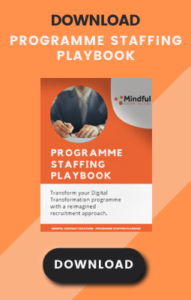Academic research suggests that when corporations launch a digital transformation, roughly 70 per cent fail.
So how can organisations ensure their digital transformation programme is a success and delivered right the first time?
Helpfully, back in August we asked Nick McGrath, Director of the MyCO Programme, this exact question.
We draw on what we learnt from our chat with Nick and list 4 key factors for digital transformation success.
The importance of good data
Nick explained that the biggest impact on the Government’s direction on digital transformation going forward will be to inform decision making based on data. This is perhaps unsurprising as having access to good-quality data leads to better decision-making across an organisation. To deal with your user group most efficiently, it is necessary to have access to the correct and appropriate data.
Nick stated that it is going to mean that the Government need to be able to do three things. We’re very quickly going to have to learn how to deal appropriately with citizens much more efficiently. Capture their data in a much more consistent way. And use that data to help us drive decisions about what the most effective way to spend money is.
However, due to our current predicament it has become much more difficult for organisations to obtain good data. We’re no longer going to have the luxury of lots of different ways of contacting the same citizen. This is because we are going to be under enormous financial pressure due to the pandemic and the impact of it.
Compile a good plan
American author Alan Lakein famously coined the phrase “failing to plan is planning to fail”. Nick Smallwood, who is the CEO of the IPA, clearly agrees. He says that the success or failure of programmes is determined in its early stages. As such, the IPA advocates spending a lot of time planning.
Therefore, we asked Nick what he believed programmes should focus on at the planning stage to increase their odds of success. He argued that managing change is more than a comms and training plan. You have to explicitly plan for changes to people’s roles and changes to the way that both shared services, the HR and finance functions (as well as end-users) are structured and are organised into teams.
Before the plan is compiled the stakeholders must understand all of the different things that are going to have to happen for you to realise benefits beyond implementing the IT. If you get started and you have a plan which doesn’t include the changes that they need to make to realise benefits, then it doesn’t matter how well the rest of the plan goes. You could deliver all of the IT team to budget and you still wouldn’t get the benefits.
Reorganise the organisation
The third factor consists of reorganising the organisation. For a lot of programmes, it is based on we’ll move to the new technology and then we’ll get the following benefits. However, a lot of the time when you don’t get the following benefits it’s not because the technology doesn’t work. And it’s not because the technology doesn’t do what you thought it was going to do. It’s because your organisation hasn’t reorganised itself to exploit it properly and to work differently.
Nick also added a word of advice for when you’re making a business case to seniors. You need to turn the tables on your stakeholders and say whether this has got benefits is really down to you. The real key to whether it delivers any benefit at all is whether or not you are prepared to reorganise the way that you work. And also tell people that we are now going to do things in a different way.
Dedicated highway to easily bring in specialists
In Mindful’s experience of working in programmes a lot of time is spent on staffing your team. Access to on-demand talent is a high value and frequent need for programmes. Despite this, the bureaucracy of organisational processes only slows down such programmes.
There are too many external stakeholders, too many suppliers and too many end-users with competing priorities. All of this creates risk. As Nick explained, it’s a fact of life that there are processes that can make it difficult for you to get the right resources. That is an enormous distraction from being able to get on with the work.
We asked Nick whether he supported Major Programmes that act as temporary organisations to have a dedicated highway to external talent for programmes. He explained that obviously it’s a challenge and there are rules that must be followed. But if there was a way of expediting that then it would save time and be a saving for the taxpayer.
At Mindful, we believe that where you have a choice you should chart your own course and set up your own dedicated route to the external supply markets. For example, owning your interim staffing through a dedicated partner.
Final thoughts
Many digital transformation programmes fail to achieve what they set out to achieve. This post sets out 4 factors to achieve digital transformation success. You can download the full transcript from our interview with Nick McGrath here.
Keep updated on future announcements by following us on LinkedIn and Twitter.


